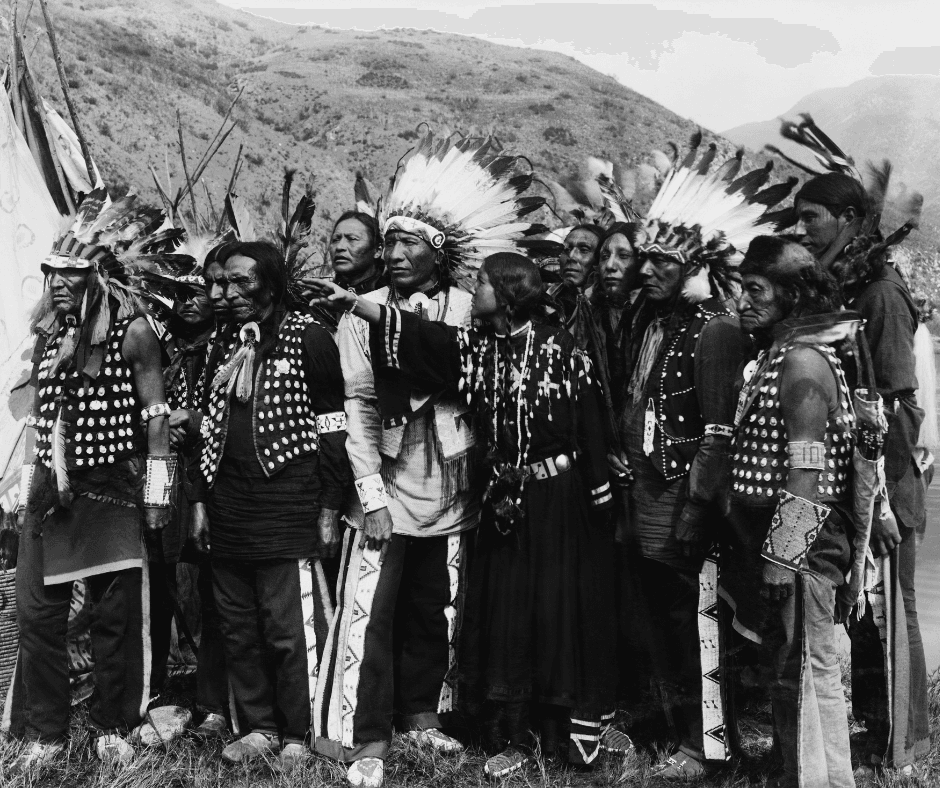
Far too many of us who have been through the American education system have memories of Thanksgiving lessons, pageants, and art projects: the paper headdresses and pilgrim hats, the story of nondescript Native Americans cheerfully welcoming pilgrims to ‘America’, and the overarching idea of a peaceful ‘hand-off’ of land from native people to colonizers. While this narrative came from an actual instance of the Wampanoag tribe feasting with the settlers in Plymouth, following the colonists first successful corn harvest, this tradition of honoring the “first Thanksgiving” grossly overlooks the brutality cast upon the indigenous peoples of this land. Scores and scores of violence, genocide, erasure, and displacement are set aside on Thanksgiving day, so that Americans can celebrate one outlier of peace between Native Americans and the colonizers who systematically stole their land and many of their lives.
Such a bloody history can certainly dampen the cozy gratitude that so many of us want to practice and celebrate on this holiday. Because of this tradition of masking violence perpetrated by the settlers of this country, many feel that this holiday should be put to sleep. In fact, many indigenous communities take the fourth Thursday in November to observe a day of mourning for those who have lost their lives to settler colonialism. Others, however, feel that although the story of the first Thanksgiving obfuscates the historically violent relationship between settlers and Native Americans, the lessons that the holiday promotes are positive: practicing gratitude, bringing communities together, celebrating the bounty of the earth, and centering the voices, experiences, and needs of indigenous people. The decision of how to observe this day is personal and complex, but regardless of how you choose to spend the holiday, here are some things to consider.
- When enumerating the aspects of your life for which you are thankful, consider your own ancestry. Odds are, history has played a role in bringing you what you are grateful for. Owning your privilege and how it came about doesn’t need to be the impetus for a guilt-filled day of silence. Rather, it can be a reminder of the responsibility that comes with having privilege, and an encouragement to use that privilege to work toward equity, safety, and justice.
- Learn the history of the land on which you reside. Learn about the native tribes who more-than-likely still live in your area. The history of violence against native peoples in this country can often lead Americans to believe that indigenous people no longer occupy this land. Educate yourself on the legacy of whose land was stolen to form your hometown. RTS resides in what is currently known as Burlingame, CA, but is the land stolen from the Ramaytush Ohlone people—people who still live in the Bay Area and must bear witness to the loss of their native land every day.
- Think about how you can honor indigenous communities. Native people in this country continue to face drastic oppression, and despite avid efforts to create lasting change for their communities, indigenous activists are far-too-often ignored, cast aside, and violated even further. Over the Thanksgiving holiday, make concerted efforts to absorb the words of indigenous activists. Hear their calls to action, learn what challenges they face, and most importantly, follow what they say. They know the best paths forward for their own liberation. Take action. Make an effort to prioritize indigenous safety, and understand the urgency of these issues.
- Repay the earth. Whether you pick up trash in your neighborhood, plant something new in your backyard, try to stay trash-free for a day, or join the mailing list of an environmental justice group; give thanks for what this land has sacrificed to Western conquest and industrialization, and do something to protect our planet.
- Implement ways to keep yourself accountable. It will take more than one day a year to achieve justice. Find ways to check in with yourself regularly to ensure that you are continuing to do your part to work toward equity in this country. Consider setting up a regular donation to an indigenous-led organization. Put time on your calendar to check the latest reports of Missing and Murdered Indigenous Women and Girls (MMIWG). Sign up to volunteer with an organization that works to reverse climate change and the destruction of our environment. No matter what you do, just be sure that you are staying accountable to the causes you care about.
To those who take time out of their holiday to prioritize the safety of those who are victimized in our current reality, we are thankful for you. Accepting the dynamic nature of the tradition of Thanksgiving isn’t always pleasant, but to achieve justice for Native Americans, it is necessary...and long-past due.
